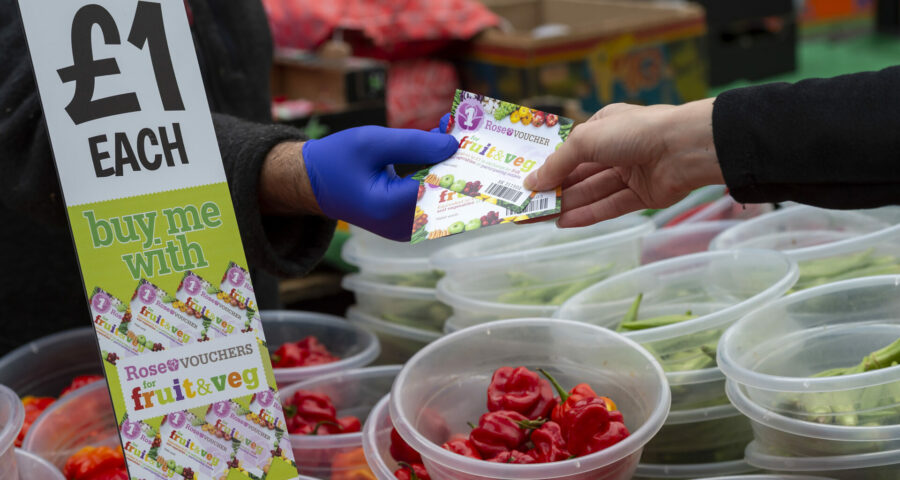At Alexandra Rose Charity we believe that everyone should have access to a healthy, sustainable, local food economy. This aim sits alongside improving the health and wellbeing of families on low incomes as the two “ultimate goals” of the Charity.
In the United Kingdom markets have an illustrious history providing food that communities need to thrive (for example Borough Market in Southwark, claims to be the oldest food market dating back to 1276). That’s why at ARC we chose markets as the key vehicle for the Rose Vouchers for Fruit & Veg Project to improve access to healthy food for the families we work with. Every day, markets provide an invaluable economic, social and public health service. Through them, communities access a healthy diet and avoid food insecurity, and access affordable produce that meet their cultural needs. They provide jobs for local people, and a place for entrepreneurs (many from ethnic minority communities) to build thriving businesses. These businesses aren’t just good for their customers they are good for the wider local economy. Research from New Economics Foundation shows that money spent in traditional retail markets stay circulating in the local economy – creating a local multiplier effect that has a positive impact on overall community wealth. Despite this, traditional retail markets have been in national decline for many years.
How have we helped? At ARC we have been working with traditional market traders in the Southwark and Lambeth boroughs for more than six years, learning more about this industry and its challenges. Over the last nine months we have pursued some intensive engagement work with traders at East Street Market and Peckham with support from retail consultancy Rice Retail Marketing.
We wanted to explore two important questions with the traders. Firstly, how can they make the most of the economic opportunity provided by the Rose Voucher scheme? And secondly, what is their role in improving the public health outcomes for their local community? It didn’t take long for us to uncover some important market findings. A price comparison survey with the Morrison’s Supermarket at the bottom of East Street Market found that the market was 66 percent cheaper on like for like fruit & veg products!
Market traders are a vital lynchpin in our local food economies that help people access a healthy diet and avoid food poverty every day of the week. Without them our local food culture is poorer — culturally, economically, and nutritionally.
During our work with traders on East Street we’ve found out how vibrant and dynamic these businesses are. We’ve also encountered barriers to engagement, lack of transparency around business practices, and challenging regulatory environments. This shouldn’t put us off working with these entities. The very fact that they are businesses predominantly led by local people, from diverse ethnic backgrounds, providing a crucial public service, means we should be prioritising working with them over other local actors.
What’s next for ARC? We want local and national actors from public health and economic development to recognise the role that markets are playing in the wellbeing of communities. We want to work with market managers and traders to enhance their impact of markets and support them to do more, and do it better. And we want to develop resilient market cultures across Southwark & Lambeth that can weather changing local dynamics so that all communities have equal access to healthy and affordable food, now and in the future.
At ARC that’s what we try to do. It’s not always easy, but the rewards are great and the impact on local communities even greater.

Jonathan Pauling
Chief Executive, Alexandra Rose CharityJoin the next virtual Childhood Obesity Programme Network event on Friday 8 October, 12:30pm – 14:00pm, and hear more from Jonathan on what it really means to support a healthy and independent local food economy, and what we can do collectively to support it to thrive.

